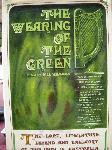
 The Wearing of the Green : The Lore, Literature, Legend and Balladry of the Irish in Australia
anthology
humour
The Wearing of the Green : The Lore, Literature, Legend and Balladry of the Irish in Australia
anthology
humour

 The Wearing of the Green : The Lore, Literature, Legend and Balladry of the Irish in Australia
anthology
humour
The Wearing of the Green : The Lore, Literature, Legend and Balladry of the Irish in Australia
anthology
humour
'A collection of excerpts of longer works, poetry and short stories, each introduced with some background information about the work and author.
'About 25% of the Australian population is of Irish descent; but the Irish influence in the shaping of Australian attitudes and outlook have been more substantial than the numbers would suggest.
'From the eminence of the great archbishop Mannix to the notoriety and roguery of Ned Kelly; from the bravery of Robert O'Hara Burke of Burke and Wills to to the lowliness of the assassin O'Farrell; from the leadership of Peter Lalor to the rugged courage of Les Darcy, the Irish have cut a swathe through Australian life.
'Many of them were articulate men and have left a vast body of literature, folklore and balladry. It is a literature which comes not only from the educated such as Archbishop Mannix, Charles Gavan Duffy, John Mitchel and Mr Justice Therry, but also from the unskilled but passionate words of Ned Kelly and the many traditional ballads and songs which rose from the voices of often suppressed Irish.
'This is a fascinating account of this winning and telling Irish influence seen through the eyes of many writers and contributors.' (Dust Jacket)
'The Australian branch of the modern Irish diaspora has several apparently distinctive features, when compared with the British, American and Canadian branches. As explained by the historian Oliver MacDonagh, these include, firstly, its large size in relation to the total population – over 30% in the eastern mainland states, and sustained at that level down to the First World War and beyond; secondly, its unusually uniform distribution around the country, geographically, socially and even occupationally, with relatively strong Irish presences in all states, and in all classes and occupations (except the higher financial professions), but notably the law, politics, journalism and teaching; and thirdly their unique position within the diaspora,as a founding people, arriving at the beginning of European settlement (mainly as convicts and soldiers), and thereby staking a claim, and an interest, in the shape and destiny of the nation as a whole.' (Author's introduction)
'The Australian branch of the modern Irish diaspora has several apparently distinctive features, when compared with the British, American and Canadian branches. As explained by the historian Oliver MacDonagh, these include, firstly, its large size in relation to the total population – over 30% in the eastern mainland states, and sustained at that level down to the First World War and beyond; secondly, its unusually uniform distribution around the country, geographically, socially and even occupationally, with relatively strong Irish presences in all states, and in all classes and occupations (except the higher financial professions), but notably the law, politics, journalism and teaching; and thirdly their unique position within the diaspora,as a founding people, arriving at the beginning of European settlement (mainly as convicts and soldiers), and thereby staking a claim, and an interest, in the shape and destiny of the nation as a whole.' (Author's introduction)